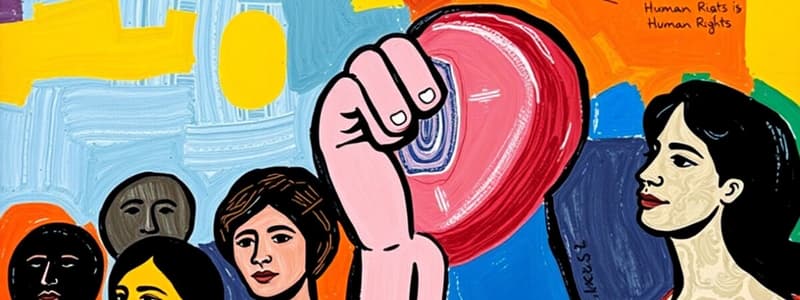Podcast
Questions and Answers
What is a significant role of the ICC in international criminal justice?
What is a significant role of the ICC in international criminal justice?
- Holding individuals accountable for serious human rights violations (correct)
- Mediating diplomatic disputes between countries
- Providing legal representation to victims of human rights violations
- Enforcing economic sanctions on violating states
Which of the following is NOT a state action that can violate human rights?
Which of the following is NOT a state action that can violate human rights?
- Extrajudicial killings
- Torture
- Arbitrary detention
- Freedom of speech (correct)
How does poverty affect human rights?
How does poverty affect human rights?
- It has no impact on human rights issues
- It hinders the realization of rights for vulnerable populations (correct)
- It directly enhances the realization of human rights for all
- It primarily affects only economic rights
In the context of human rights, what can armed conflict lead to?
In the context of human rights, what can armed conflict lead to?
What is essential for achieving a just and equitable world according to the principles of human rights?
What is essential for achieving a just and equitable world according to the principles of human rights?
What does it mean for human rights to be considered universal?
What does it mean for human rights to be considered universal?
Which instrument is legally binding and guarantees civil and political rights?
Which instrument is legally binding and guarantees civil and political rights?
Which of the following best describes economic, social, and cultural rights?
Which of the following best describes economic, social, and cultural rights?
What is a key feature of the Universal Declaration of Human Rights (UDHR)?
What is a key feature of the Universal Declaration of Human Rights (UDHR)?
Which of the following rights is considered a civil and political right?
Which of the following rights is considered a civil and political right?
What is the role of national mechanisms in human rights enforcement?
What is the role of national mechanisms in human rights enforcement?
Which body is primarily responsible for overseeing compliance with international human rights standards?
Which body is primarily responsible for overseeing compliance with international human rights standards?
Which of the following is an example of collective rights?
Which of the following is an example of collective rights?
Flashcards
Human Rights
Human Rights
Fundamental rights inherent to all people, regardless of their background.
Universal Declaration of Human Rights (UDHR)
Universal Declaration of Human Rights (UDHR)
Landmark document outlining fundamental rights and freedoms.
Civil and Political Rights
Civil and Political Rights
Rights protecting individual freedom and participation in society.
Economic, Social, and Cultural Rights
Economic, Social, and Cultural Rights
Signup and view all the flashcards
Collective Rights
Collective Rights
Signup and view all the flashcards
International Covenant on Civil and Political Rights (ICCPR)
International Covenant on Civil and Political Rights (ICCPR)
Signup and view all the flashcards
International Covenant on Economic, Social and Cultural Rights (ICESCR)
International Covenant on Economic, Social and Cultural Rights (ICESCR)
Signup and view all the flashcards
International Criminal Court (ICC)
International Criminal Court (ICC)
Signup and view all the flashcards
Inalienable Rights
Inalienable Rights
Signup and view all the flashcards
National Mechanisms
National Mechanisms
Signup and view all the flashcards
International Mechanisms
International Mechanisms
Signup and view all the flashcards
International Criminal Justice
International Criminal Justice
Signup and view all the flashcards
State Violations
State Violations
Signup and view all the flashcards
Human Rights Violations
Human Rights Violations
Signup and view all the flashcards
Poverty & Inequality
Poverty & Inequality
Signup and view all the flashcards
Conflict & Displacement
Conflict & Displacement
Signup and view all the flashcards
Discrimination & Marginalization
Discrimination & Marginalization
Signup and view all the flashcards
Protecting Human Rights
Protecting Human Rights
Signup and view all the flashcards
Promoting Human Rights
Promoting Human Rights
Signup and view all the flashcards
Study Notes
Introduction to Human Rights
- Human rights are fundamental rights inherent to all individuals regardless of race, sex, nationality, ethnicity, language, religion, or any other status.
- These rights are universal, indivisible, and inalienable, meaning they cannot be taken away.
- The Universal Declaration of Human Rights (UDHR) serves as a cornerstone document, outlining a broad range of fundamental human rights.
- International human rights law aims to protect and promote these rights globally.
Key Categories of Human Rights
- Civil and political rights: These rights protect individuals' freedoms and ensure their participation in society without discrimination. Examples include freedom of speech, religion, assembly, and the right to a fair trial and due process.
- Economic, social, and cultural rights: These rights address the well-being and development of individuals. Examples include the right to work, education, health, and an adequate standard of living.
- Collective rights: These rights are associated with groups or communities, such as the right to self-determination, cultural preservation, and development.
Key Documents and Instruments
- Universal Declaration of Human Rights (UDHR): A landmark declaration that outlines fundamental human rights and freedoms. While not legally binding, it has profoundly influenced subsequent international human rights law.
- International Covenant on Civil and Political Rights (ICCPR): A legally binding treaty that guarantees civil and political rights, such as the right to life, freedom from torture, and freedom of expression.
- International Covenant on Economic, Social and Cultural Rights (ICESCR): A legally binding treaty that assures economic, social, and cultural rights, such as the right to education, work, and an adequate standard of living.
- International Criminal Court (ICC): A permanent tribunal that prosecutes individuals for war crimes, crimes against humanity, and genocide.
Enforcement and Accountability
- National mechanisms: States have a responsibility to uphold human rights within their jurisdictions through domestic legislation, institutions, and procedures.
- International mechanisms: International bodies, such as the Human Rights Council and treaty bodies, oversee compliance with international human rights standards.
- International criminal justice: The ICC has a crucial role in holding individuals accountable for serious human rights violations.
Challenges and Issues
- State violations: States can violate human rights through actions like torture, extrajudicial killings, and arbitrary detention.
- Poverty and inequality: Poverty and social inequalities frequently hinder the realization of human rights for vulnerable populations.
- Conflict and displacement: Armed conflict and forced displacement can cause severe human rights abuses.
- Discrimination and marginalization: Various forms of discrimination and marginalization, based on grounds like race, gender, religion, and sexual orientation, often violate human rights.
Conclusion
- The protection and promotion of human rights are complex and ongoing tasks, requiring constant vigilance and commitment from individuals, states, and international organizations.
- Recognizing the fundamental dignity of all individuals and ensuring equal protection under the law are essential for achieving a just and equitable world.
Studying That Suits You
Use AI to generate personalized quizzes and flashcards to suit your learning preferences.




